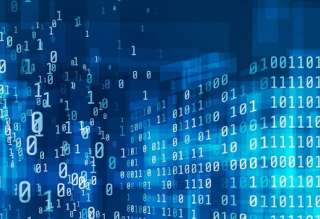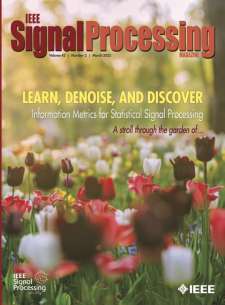Signal Processing Is More than Its Beloved Name
Top Reasons to Join SPS Today!
1. IEEE Signal Processing Magazine
2. Signal Processing Digital Library*
3. Inside Signal Processing Newsletter
4. SPS Resource Center
5. Career advancement & recognition
6. Discounts on conferences and publications
7. Professional networking
8. Communities for students, young professionals, and women
9. Volunteer opportunities
10. Coming soon! PDH/CEU credits
Click here to learn more.
Signal Processing Is More than Its Beloved Name
Since its inception in 1948, the IEEE Signal Processing Society (SPS) has evolved in pace with the many technological changes and advancements in our field. In its early days, our Society— the first and oldest among the IEEE’s Societies—was known as the Profes- sional Group on Audio of the Institute of Radio Engineers. Over the course of four decades, our name has changed few times from Audio to Audio and Electro- Acoustics and then to Acoustics, Speech, and Signal Processing, and then to Signal Processing to reflect the field’s growth and diversity, becoming the IEEE Signal Processing Society in 1989.
Since then, our scope of interest has been revised twice to reflect new theo- ries and applications, and many SPS technical committees have also changed their names. Our Society has also devel- oped many new workshops, conferences, specialized publications, journals, peri- odicals, and outreach programs in an effort to celebrate the achievements of our members, strengthen our indus- try networking opportunities, and also increase public awareness about sig- nal processing.
We’ve made great strides, but our field is consistently evolving while eyeing the future. Over the past few years, members have suggested that we’re perhaps due for another name change, that the term signal processing is obscure and doesn’t ade- quately capture the scope, range, dynam- ic nature, and fundamental impact of our chosen field on so many facets of every- day life. We are certainly not alone in this dilemma. For example, the famous math- ematician Stanislaw Ulam wrote: “What exactly is mathematics? Many have tried but nobody has really succeeded in defin- ing mathematics; it is always something else. Roughly speaking, people know that it deals with numbers, figures, with relations, operations, and that its formal procedures involving axioms, proofs, lemmas, and theorems have not changed since the time of Archimedes.”
By comparison, our field is in its infancy, but it has grown and expanded rapidly to include many branches and subspecialties. So, in December 2013, our Society formed a committee, headed by Prof. Petar Djuric, to explore the pos- sibility of a new name. The committee wrote a wonderful blog post about this topic (see article), soliciting member feedback, and listed nine previ- ously suggested name changes:
1) Society on Signal Science and Engineering
2) Society on Signal Processing and Data Science
3) Society on Signal and Data Science
4) Society on Signal Science and Processing
5) Society on Data Science and Processing
6) Society on Data and Signal Processing
7) Signal and Information Processing Society
8) Society for Data Science
9) Data Science Society.
Notice that the term data science is in five of these nine suggestions and data is in six, but the word information is only in one. The post elicited a lively discussion. Among the 58 respondents, some favored a name change, and Signal and Informa- tion Processing was the most popular of the proposed names, favored by 21 respondents. Yet the majority of respon- dents (28) preferred to stick with our cur- rent name, saying that while it may not be inclusive of everything that we do, it’s the most succinct way to describe our complex, evolving field. Indeed, the very definition of a signal means the conveyer of some type of informa- tion, while the information within the signal is often related to knowledge and intelligence.
The respondents were certainly not unanimous that a name change would either increase or decrease our vis- ibility among the general public, while also reflecting the monumental chang- es in our field since 1989. Whatever the ultimate decision, I agree with the recommendations that we would certainly benefit from improving the strength and clarity of our brand mes- saging, by articulating the impact of signal processing on so many fields, such as finance, seismology, satellite communication, medical instruments, and a wide range of commercial elec- tronics and wearable technologies that billions of people use every day—at work, at play, and, in almost every facet of communication.
Highlights from Society members’ responding to Prof. Djuric’s blog post about the name change proposal are given next. I’m pleasantly surprised by the number and depth of these com- ments. It shows that this topic is timely and of great interest to our community.
Signal processing is “present in nearly all the trendy mobile devices,” according to one respondent, yet it’s not well under- stood by our peers in science, industry, and the general public “is oblivious to the concept.” It’s a fitting paradox for signal processing, which is described in the book Essentials of Digital Signal Processing [1] as the “phantom technol- ogy because it is so pervasive and yet not well understood.”
Another participant agreed, writing, “Signal processing is still a mystery to many of our peers, and it does not ade- quately reflect the current activities.” Others pointed out that this dilemma hin- ders our ability to attract good students to the field, negotiate promotions at univer- sities and corporations, and “build a vis- ible ecosystem” upon which individuals could envision a career.
The diversity in theories and appli- cations within our field can be viewed as both a benefit and a hurdle. One per- son wrote that our branding challenges “will get worse with signal processing getting more diverse and intangible” as the emphasis shifts from boards and cir- cuits to software applications. Yet how do we strive to be both more inclusive and more succinct with our branding? Some participants suggested adding various qualifiers, the most popular of which were data, data science, science, signal science, engineering, and infor- mation processing.
The term data received a few favo- rables. With the increased emphasis and publicity on data in recent years, I won- der whether more respondents would have favored this term had the blog been posted a couple of years later. Others felt that while it’s currently trendy and may have increasing funding opportuni- ties, it may have a short shelf life and it’s too broad and generic and too specific to computer science, data processing and “big data”—implying all are poorly understood by the general public. There are also educational differences to con- sider. One respondent pointed out that, while signal processing necessitates an advanced scientific education and carefully conducted scientific proto- cols, it only takes a few courses in com- puter science and web programming to become a “data scientist.”
The addition of the term science also received mixed reviews. As one respon- dent pointed out, “We are not scien- tists—we are engineers, and I for one am damn proud to call myself an engineer. Scientists take things apart; engineers put things together. Not only are these fields different, they are polar oppo- sites.” Someone else wrote, “Engineers is what we are, and signal processing is what we do.” Several people opposed the addition of the term engineering to our name. One respondent pointed out that engineering is also misunderstood by the public as dealing with work that sig- nal processors do not do, such as work related to engines.
Adding the term information pro- cessing was the most popular alterna- tive among the respondents, primarily because it best conveyed the diversity of our field and our goal to “strive to be inclusive of all its members.”
Yet other members called informa- tion processing redundant, saying that you cannot process information if it does not induce a signal; only signals that con- tain information can be processed and “signal processing” allows for informa- tion in a signal to be available in a “con- venient format.” As one respondent put it, “the word signal already indicates an information-bearing phenomenon, and signal processing already encompasses the decoding/encoding of any kind of information.” However, I wish to add here that besides “processing,” much of our work involves understanding and learning about the systems we study.
Among the various proponents of maintaining our current name, some voiced concern that a name change would dilute the brand name. The term signal processing is well established, featured in many journal titles, conference names, and the majority of academic programs. University electrical engineering depart- ments teach subjects with signal pro- cessing in the title, and these courses are often first-year courses offered to undergraduates in electrical and computer engineering, which piques the interest of young students, and sets them on the path to become signal processors.
Other supporters pointed out that the SPS is already a well-respected brand in the science and engineering commu- nity. “Let’s keep the name and improve our outreach and publicity efforts,” wrote one respondent. Another member agreed, writing, “Better outreach and publicity will fix this issue.” However instead of “marketing the subtleties of a denoising algorithm that optimizes some supercool theoretical function,” we should showcase the latest cutting- edge technologies. Another member agreed, writing, “When people ask ‘What is SP?’ I say it is ‘everything that goes on inside a smartphone’ and their eyes suddenly light up.”
“Whatever the new name of the Society, I will still say that I am a signal processing guy,” wrote one commen- tator. Another wrote, the term “signal must be kept since it represents the human instinct to communicate since the prehistoric age.”
Reading the comments on this blog has given me, a proponent of a name change, much to think about. On one hand, a name change, e.g., by adding the term data science, would, at pres- ent, help us increase our visibility and capture the interests of students, friends, and other Societies, as well as the cor- porations and industries that provide employment and help fund our research and development. Our field has defi- nitely evolved much further than pro- cessing signals measured by electronic devices and grew to processing, under- standing, and learning from data, irre- spective to whether or not it is obtained from physical or physiological processes. Also, many of the concepts and theories we have advanced have been abstracted for use in a large number of applications.
On the other hand, data science has much overlap with signal processing, mainly nonparametric, high-dimension- al statistical signal processing (which involves big data and does not model the process). Thus it could be strongly argued that data science falls with the realm of signal processing.
Furthermore, signal processing has now become much larger and diverse. It has permeated a vast number of tech- nologies and applications. Watch, for example, our video “What Is Signal Processing?” for some examples of these applications. The scope of our journals range from speech to networks, from forensics to imaging, from biomedical to multimedia, and so on. We have more than 185 Chap- ters in approximately 120 countries. This compels me to appreciate the good comments and relevant points made by those who advocate for keeping our current name, as well as feel their devo- tion to the name. Whether or not we change our name, we should continue to expand our activities to stress our wide scope, for example, by initiating a new journal, workshop, distinguished speakers, summer schools, and edu- cational material related to data science. I consider myself fortunate that I have been working in this exciting field and am equally proud to be attached to our beloved name signal processing.
Let us continue this important discussion. Please add your comments on this page.
SPS Social Media
- IEEE SPS Facebook Page https://www.facebook.com/ieeeSPS
- IEEE SPS X Page https://x.com/IEEEsps
- IEEE SPS Instagram Page https://www.instagram.com/ieeesps/?hl=en
- IEEE SPS LinkedIn Page https://www.linkedin.com/company/ieeesps/
- IEEE SPS YouTube Channel https://www.youtube.com/ieeeSPS














